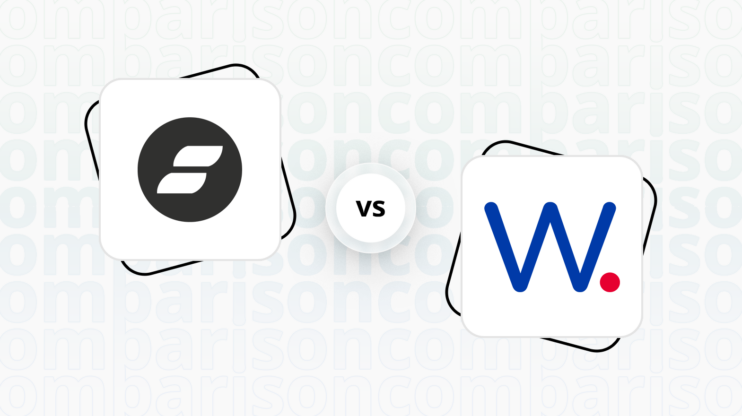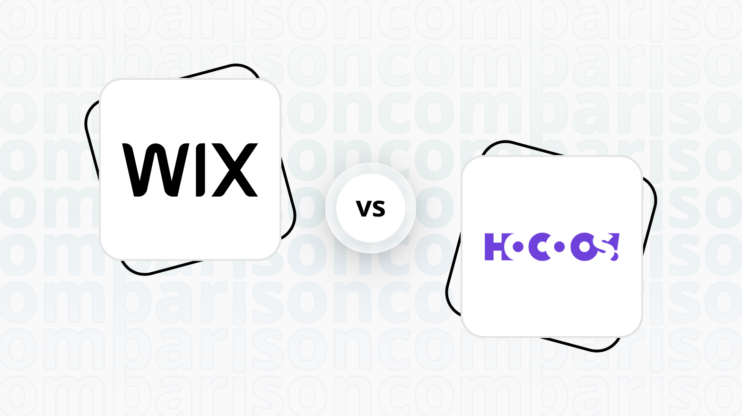Final verdict
Tilda and Appy Pie both offer unique strengths, catering to different user needs and preferences.
-
Tilda (Overall Grade: 6.7/10)
is ideal for users who prioritize design flexibility and visual content. It offers a wide range of pre-designed blocks and templates, making it suitable for bloggers, small businesses, and digital marketers. Tilda excels in typography and visual appeal, providing a professional look for websites. However, it may have some limitations in ease of use and advanced development needs compared to Appy Pie. When comparing Tilda vs Appy Pie, Tilda stands out for its design functionalities and comprehensive learning resources. -
Appy Pie (Overall Grade: 7.2/10)
is tailored for individuals and businesses looking for a quick and easy way to establish an online presence. Its no-code, drag-and-drop interface makes it highly accessible for users without coding skills. Appy Pie offers a practical solution for creating professional-looking websites efficiently, with strong ease of use and comprehensive AI capabilities. In the Tilda vs Appy Pie comparison, Appy Pie excels in ease of use, hosting quality, and customer support, making it a great choice for users seeking simplicity and quick deployment.

|

|
|
|---|---|---|
|
Design functionalities & templates |
8.6 |
6.8 |
|
Ease of use |
8.0 |
8.3 |
|
Ecommerce |
7.2 |
7.2 |
|
Website Editors |
8.0 |
7.7 |
|
Product testing options |
5.9 |
8.9 |
|
Price |
8.0 |
7.4 |
|
Hosting quality |
6.2 |
6.9 |
|
Website speed optimization |
4.9 |
5.0 |
|
Plugins and integrations |
7.6 |
6.4 |
|
Marketing features |
6.9 |
7.5 |
|
Customer support |
5.5 |
8.2 |
|
Security |
7.6 |
7.5 |
|
AI capabilities |
2.1 |
7.2 |
|
User Management |
7.3 |
7.3 |
| Overall |
6.7 |
7.2 |
Best for ecommerce
 7.2
7.2
 7.2
7.2
Verdict
: Tilda and Appy Pie both offer solid ecommerce functionalities, but they cater to different user needs. Tilda is ideal for those who prioritize design and visual content, while Appy Pie is better suited for users seeking ease of use and quick deployment.
-
Tilda
: Tilda is a versatile website builder that excels in creating visually appealing online stores. It offers a range of pre-designed blocks and templates, making it easy to set up an ecommerce site without coding skills. Tilda integrates well with various payment solutions and provides built-in CRM and marketing tools, making it a robust choice for small businesses and digital marketers. However, when comparing Tilda vs Appy Pie, Tilda might lack some advanced ecommerce features that larger stores might need. -
Appy Pie
: Appy Pie’s Website Builder is designed for quick and easy website creation, making it accessible for users of all skill levels. It offers a comprehensive suite of ecommerce features, including product and inventory management, multiple currencies, and extensive customization options. Appy Pie also supports various payment gateways and provides POS capabilities, making it a practical solution for businesses looking to establish an online presence efficiently. However, it may not offer the same level of design customization as Tilda.
Best for informational & business websites
 8.4
8.4
 7.4
7.4
Verdict
: Tilda is the superior choice for creating visually appealing and professional informational websites, while Appy Pie is more suited for users seeking a quick and easy setup with minimal technical know-how.
-
Tilda
: Tilda excels in providing a wide range of pre-designed blocks and templates that can be customized to fit various design needs. Its focus on typography and visual content makes it ideal for bloggers, small businesses, and digital marketers who want to create visually appealing websites. Tilda’s comprehensive set of integrations and advanced customization options through its Zero Block feature make it a versatile tool for building and managing online projects. With a score of 8.4, Tilda stands out for its design flexibility and professional look. -
Appy Pie
: Appy Pie’s Website Builder is designed for ease of use, offering a no-code, drag-and-drop interface that makes it accessible for users of all skill levels. It provides a wide array of templates and features for quickly creating professional-looking websites. While it may lack the advanced customization options of Tilda, Appy Pie’s focus on quick deployment and user-friendly design makes it a practical solution for individuals and businesses wanting to establish an online presence with minimal effort. With a score of 7.4, Appy Pie is a solid choice for those prioritizing ease of use and quick setup.
Detailed comparison
Design functionalities & templates
Design FunctionalitiesRepresents how well each platform allows for creative design and customization of websites.Score Components:
- Template Variety (30%): Range and quality of design templates.
- Customization (30%): Flexibility and options for design alterations.
- User Interface (20%): Ease and intuitiveness of the design process.
- Responsiveness (10%): Adaptability to different devices and screen sizes.
- Innovation (10%): Unique design features and tools.
 8.6
8.6
 6.8
6.8
🏆
Winner: Tilda.
Tilda’s focus on typography and visual content, along with its wide range of pre-designed blocks and templates, make it a superior choice for users looking for more design flexibility and customization options.
Tilda offers a diverse selection of design templates suitable for various types of content, all crafted by professional designers. These templates emphasize gorgeous typography, minimalist blocks, and striking images. Users have the flexibility to modify any template significantly or even start from scratch, ensuring the final website can meet a wide range of design preferences and requirements.
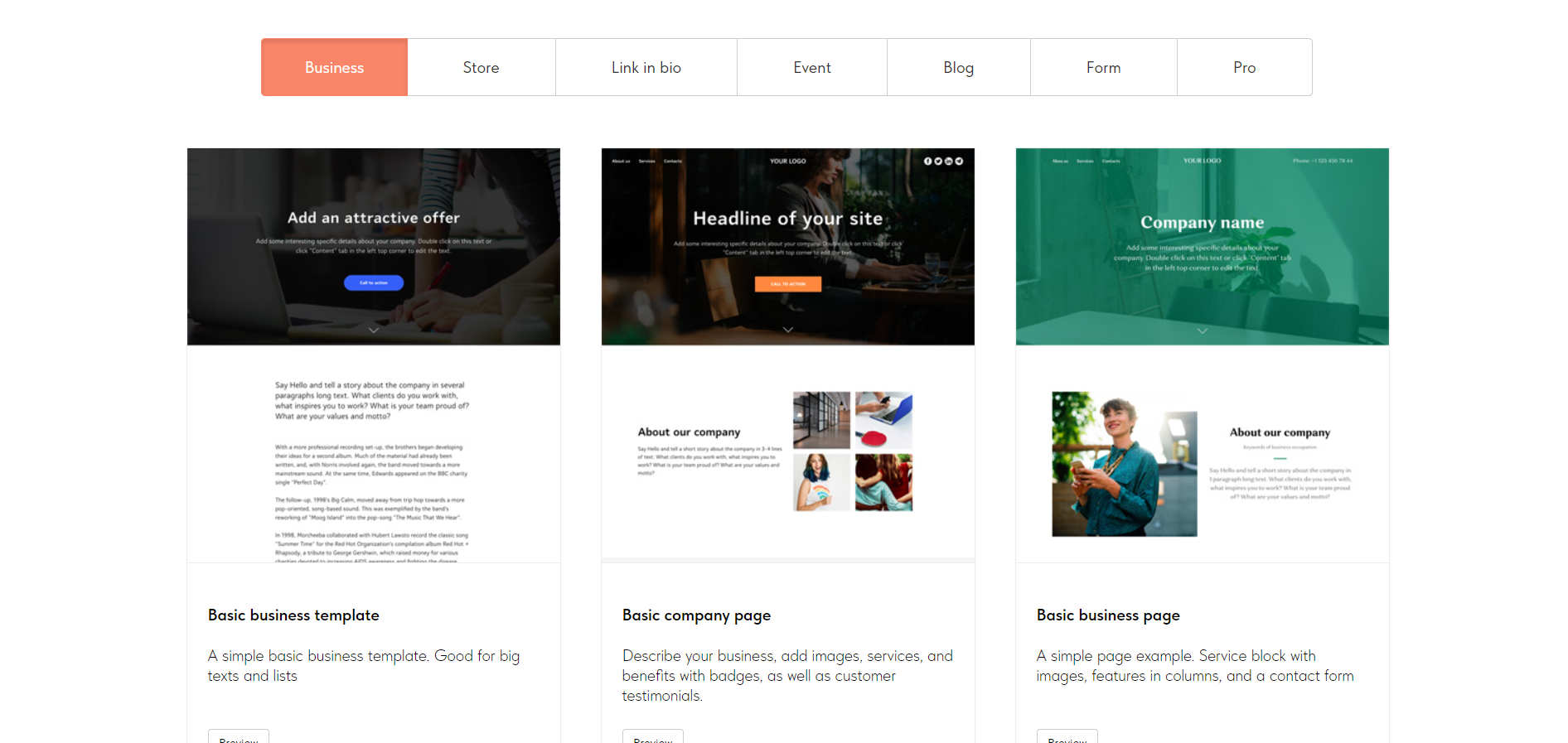
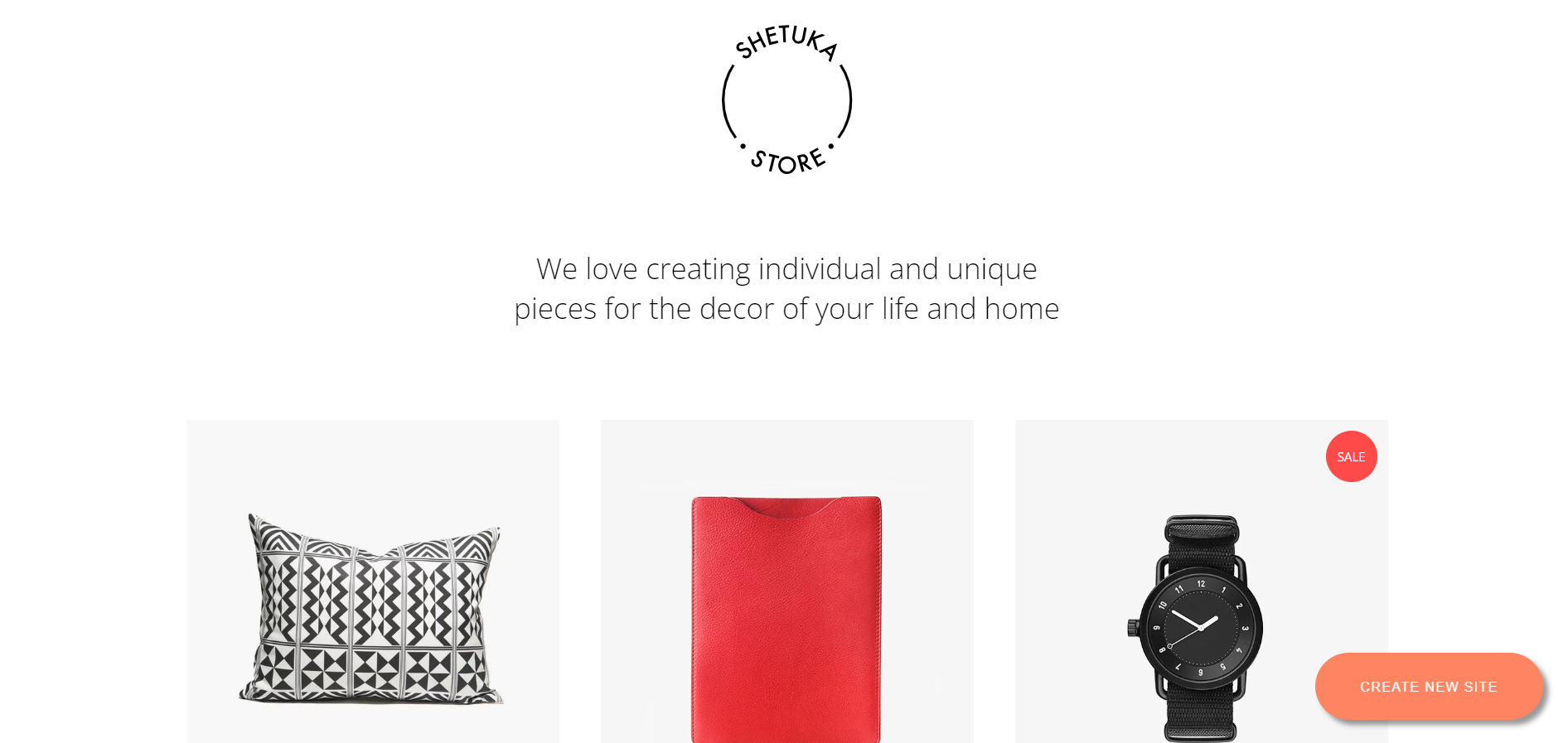
On the other hand, Appy Pie offers a wide array of website templates with over 10,000 options, catering to various needs and budgets. However, its customization flexibility is more limited compared to Tilda, and it doesn’t support entirely different mobile layouts or deeper customization options like access to HTML or CSS.
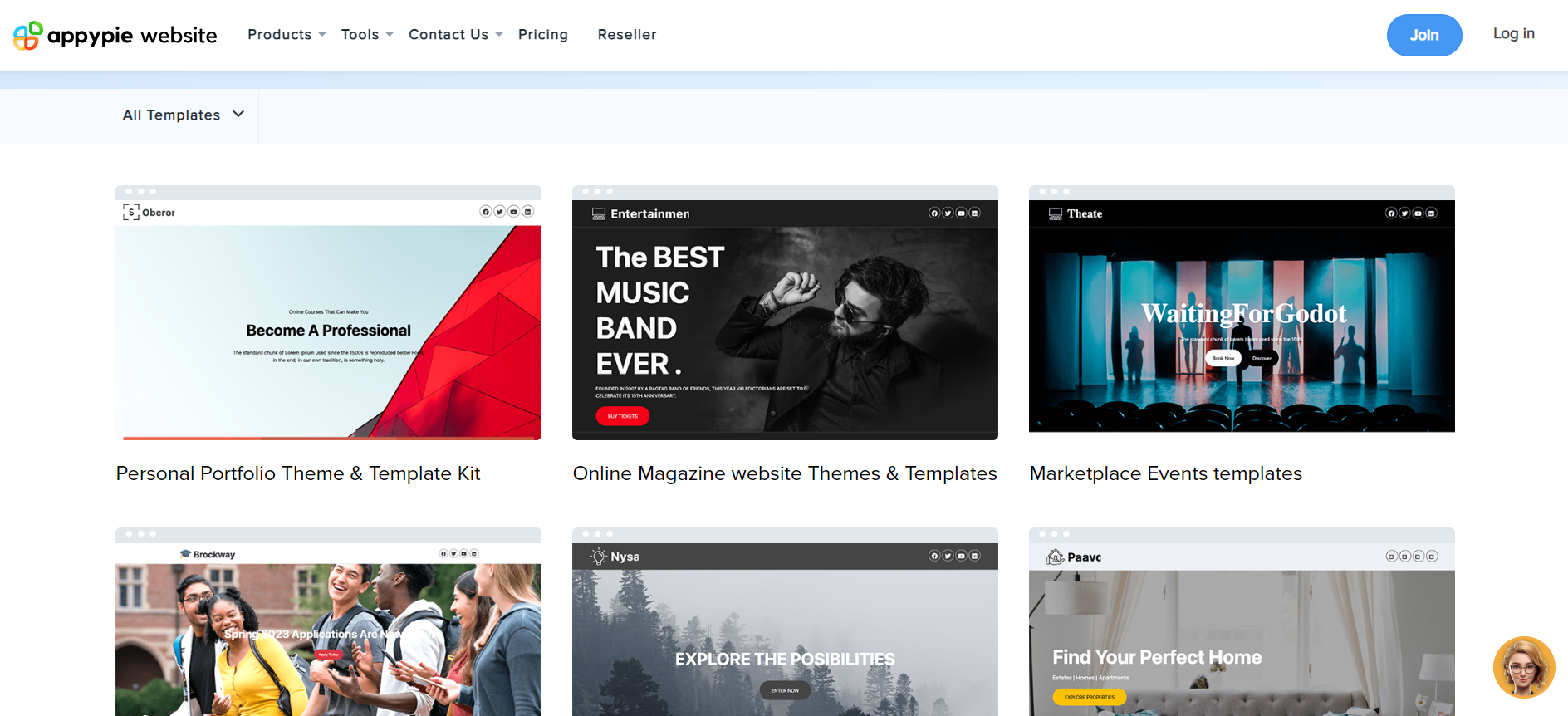
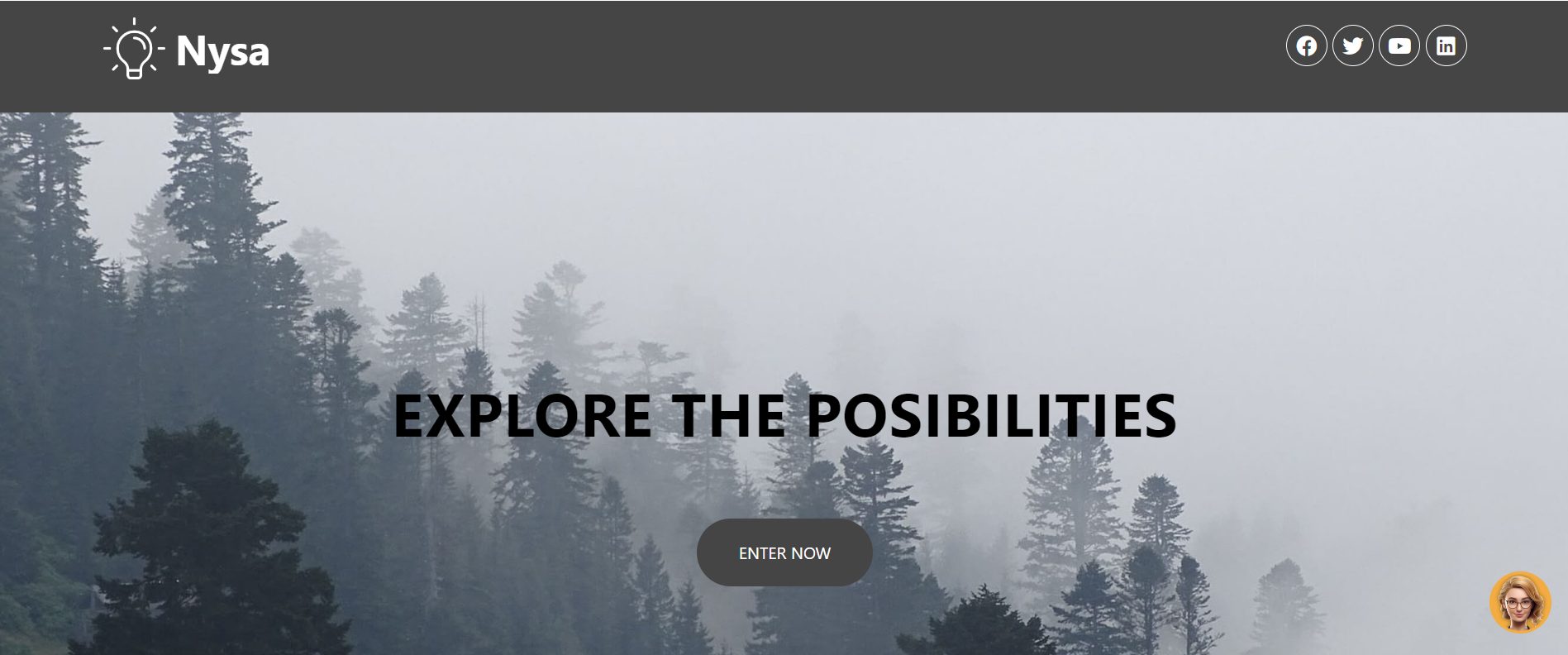
Get a head start on website creation with AI
Create a custom website tailored to your business needs 10X faster with 10Web AI Website Builder!
Ease of use
Ease of useReflects the platform’s overall user-friendliness.Score
Components:
- Learning curve (40%): Quickness and ease of getting started.
- Interface design (30%): Simplicity and intuitiveness of layout.
- User guidance (20%): Quality of tutorials and support.
- Flexibility (10%): Adaptability to various user skills.
 8.0
8.0
 8.3
8.3
🏆 Winner: Appy Pie
. Scoring a close 8.3, Appy Pie edges out Tilda, which scored 8.0, in terms of ease of use. Appy Pie’s no-code, drag-and-drop interface and pre-built templates make it highly accessible for users without coding skills. Tilda, while also user-friendly, may have some limitations for individuals with advanced development needs.
Learning Resources
🏆 Winner: Tilda
. Both platforms offer learning resources, but Tilda provides a more comprehensive set of resources, including detailed articles, tutorials, and video guides. Appy Pie’s resources are clear and well-organized, but some users have noted a need for improvement in depth, especially for advanced topics.
For ecommerce
EcommerceMeasures the platform’s effectiveness in supporting online business activities.Score Components:
- Ecommerce themes and templates (20%): Variety and design of templates.
- Product management (25%): Ease of managing and organizing products.
- Payment options (25%): Variety and convenience of payment methods.
- Ecommerce features (20%): Features for managing an ecommerce store.
- Integration (10%): Compatibility with external e-commerce tools and services.
 7.2
7.2
 7.2
7.2
Tilda and Appy Pie both offer a range of ecommerce features, making them suitable for creating and managing online stores. However, they cater to different user needs and preferences.

|

|
|
|---|---|---|
|
Ecommerce themes and templates |
6.5 |
6.0 |
|
Product page customization |
7.0 |
7.0 |
|
Payment processing and commissions |
7.5 |
6.5 |
|
POS capabilities |
0.0 |
6.0 |
|
Payment gateways |
7.8 |
7.5 |
|
Product numbers |
6.0 |
6.5 |
|
Additional ecommerce features |
6.5 |
7.0 |
Tilda ecommerce features:
- Product Catalogs and Inventory management
- Payment Gateways integration
- Shipping options
- Order management
- Built-in CRM and marketing tools
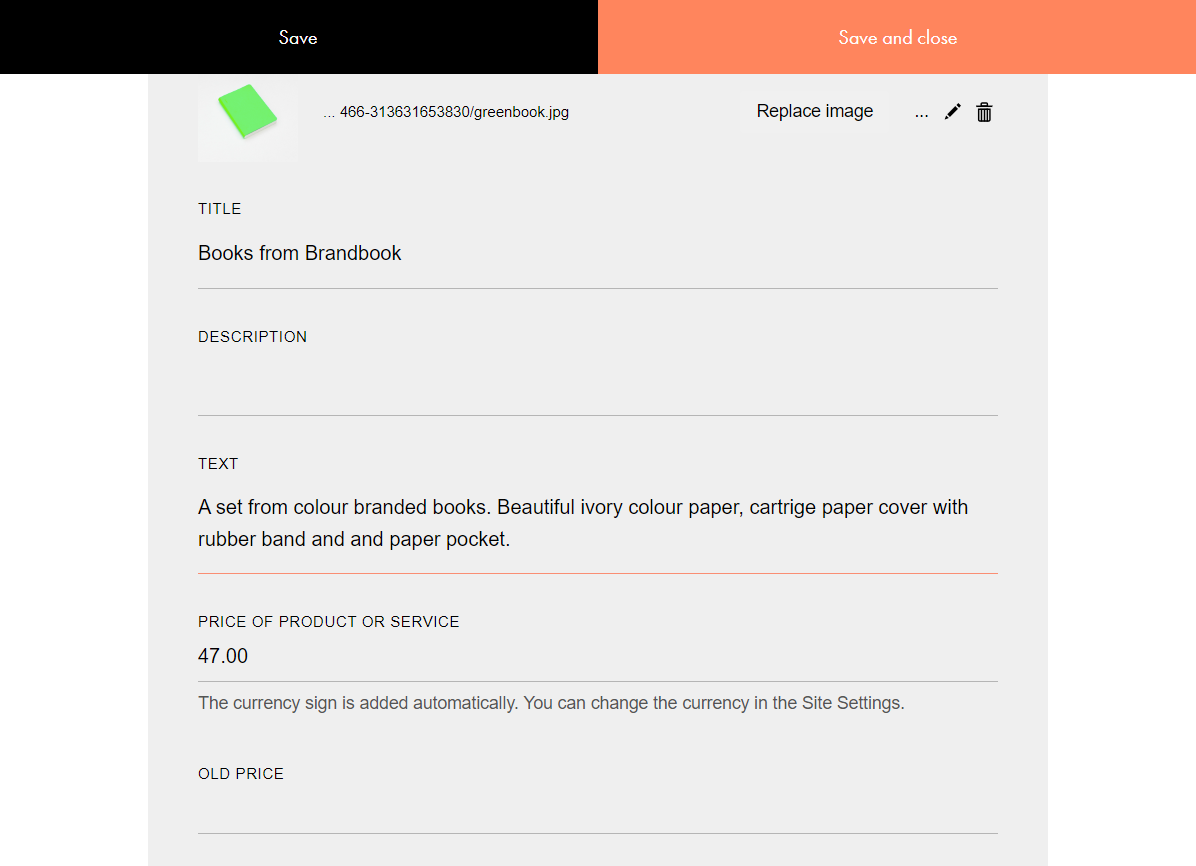
Appy Pie ecommerce features:
- Product and Inventory Management
- Shopping Cart
- Multiple Currencies
- Promotions and Discounts
- Order Management
- Shipping Options
- Analytics
- Tax management
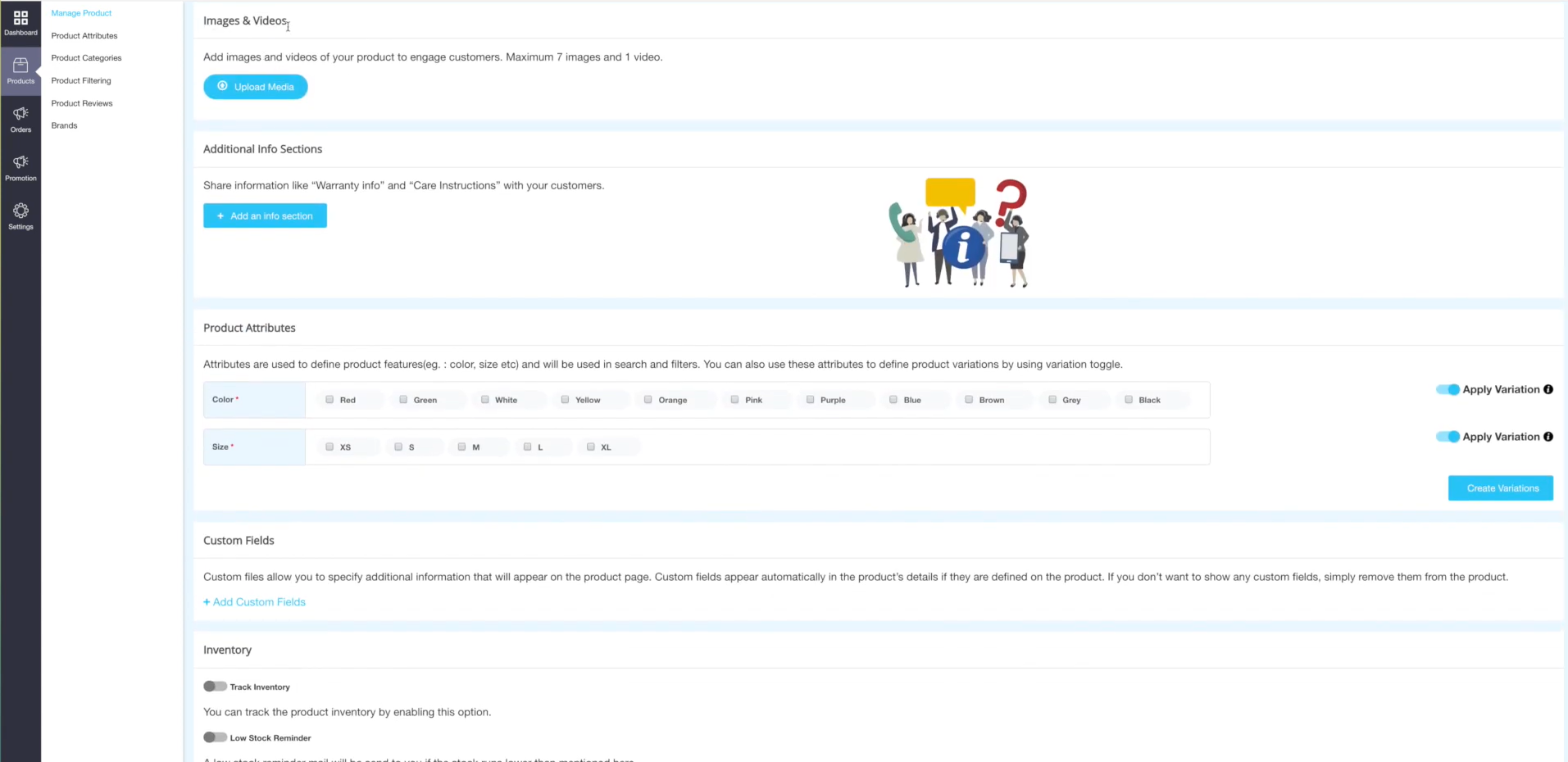
Ecommerce themes & templates
Tilda allows users to build their eCommerce sites using around 20 ready-made online store templates, emphasizing ease of use and the ability to create a store without needing coding or web design skills. On the other hand, Appy Pie offers a small selection of ecommerce website templates. These templates are designed to help users create online stores quickly and efficiently, without the need for coding skills.
Product page customization
Tilda enables a wide range of customizations for product pages in online stores, including the design, e-commerce functionalities, and integration with external services. Appy Pie’s Website Builder provides users with extensive customization options for product pages, enabling the creation of unique online stores or product showcases without requiring advanced coding skills.
Payment processing
The Tilda website builder supports a variety of popular payment systems such as Stripe, PayPal, and 2Checkout, allowing for easy integration to accept online payments. Tilda does not impose additional transaction fees beyond those of the payment gateways themselves. On the other hand, Appy Pie offers a user-friendly platform for integrating payment processing and POS capabilities into mobile apps and online stores, supporting multiple payment gateways like PayPal, Stripe, and Square for secure and versatile customer transactions.
Website Editors
Website EditorsEvaluates the platforms’ website building and editing capabilities.Score Components:
- Customization tools (40%): Range and power of editing features.
- Editor usability (30%): User experience within the editor.
- Design flexibility (20%): Freedom in layout and design changes.
- Update and maintenance ease (10%): Simplicity of updating and maintaining the site.
 8.0
8.0
 7.7
7.7
🏆
Winner: Tilda
. Tilda, with a score of 8.0, offers a user-friendly, block-based design approach that simplifies the process of creating websites without requiring in-depth coding knowledge. It features advanced customization options through its Zero Block feature, allowing for detailed control over design elements for those needing more specific layouts. The platform supports responsive design, ensuring websites are optimized for all devices, and includes built-in SEO tools, analytics, and a range of integrations with third-party services for extended functionality.
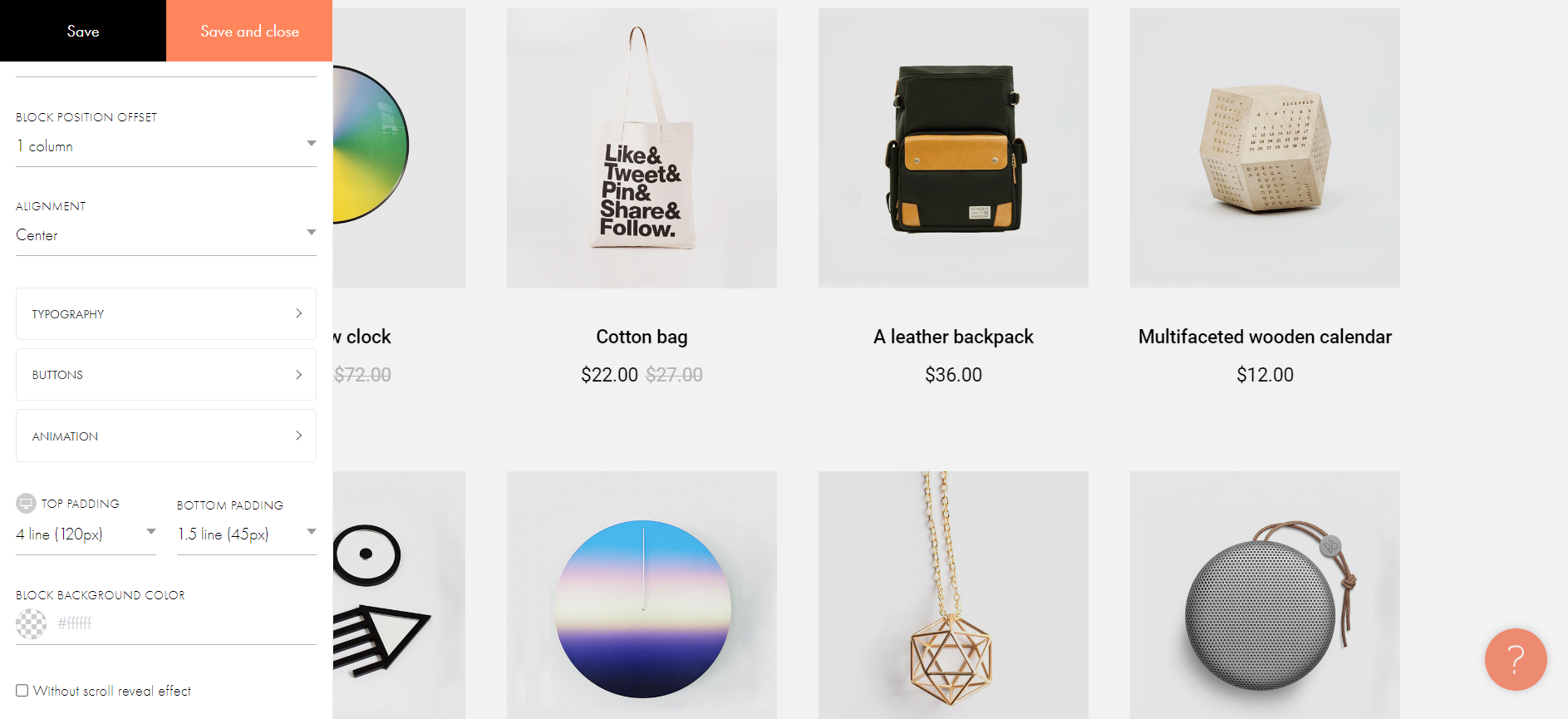
Appy Pie’s Website Builder, scoring 7.7, is a user-friendly, cloud-based platform that allows individuals, professionals, and small businesses to create mobile-friendly websites without needing to code. It offers a drag-and-drop interface, customizable templates, and various features like social media integration, ecommerce capabilities, and SEO tools. This makes it an ideal solution for quickly creating a wide range of websites, from landing pages to online stores, tailored to users’ specific needs and brand identities.
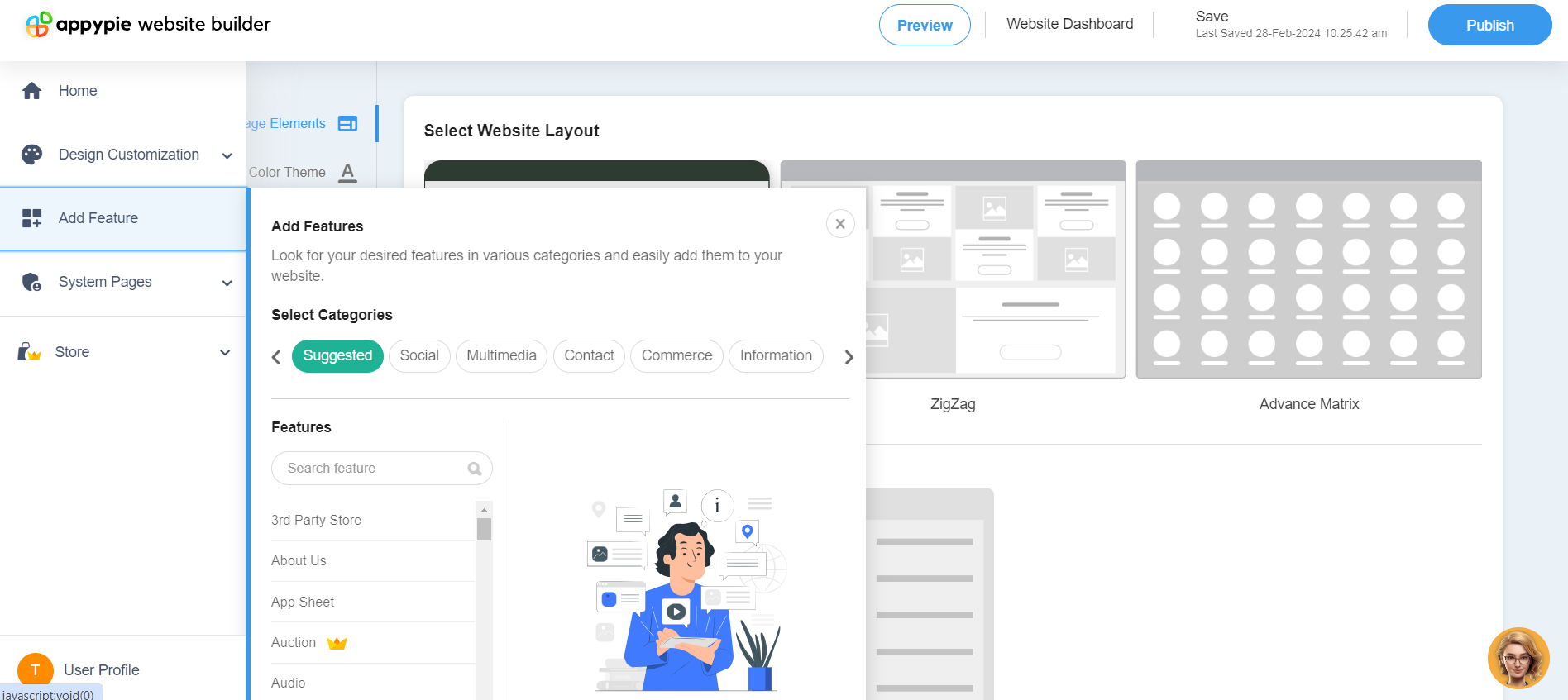
Mobile editor/app
 5.5
5.5
 5.5
5.5
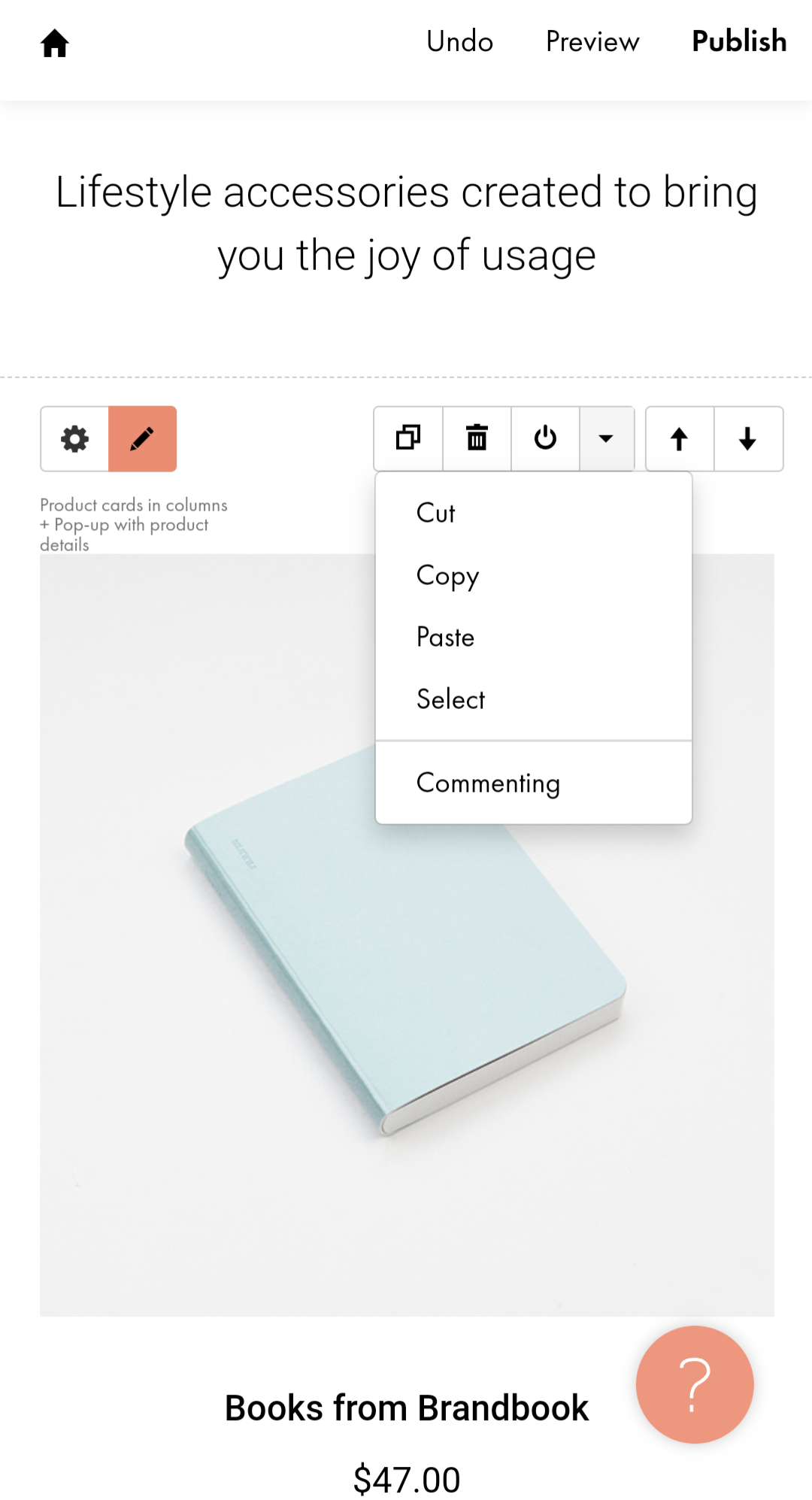
🏆
No clear winner
. Both Tilda and Appy Pie offer similar functionalities when it comes to mobile editing. Neither of the platforms has a dedicated mobile app for editing. Users have to rely on the mobile browser version of the editor for both Tilda and Appy Pie. This allows users to manage and edit their websites on the go, but the experience might not be as smooth as with a dedicated mobile app. Therefore, both Tilda and Appy Pie score equally in this category.
Tilda, on the other hand, excels in general website editing through its mobile app. It provides a user-friendly, drag-and-drop interface, allowing users to edit various aspects of their website, including content, design, layout, and blog management. The app is particularly beginner-friendly, making it easy for users with no prior website building experience.
In summary, Tilda and Appy Pie receive a similar rating due to their similar functionalities when it comes to mobile editing. Neither of the platforms has a dedicated mobile app for editing, which might not provide a smooth experience for the users.
Product testing options
Product Testing OptionsAssesses the options for trying out platform features before commitment.Score Components:
- Trial quality (40%): Extent and usefulness of the trial or free version.
- Feature accessibility (30%): How many features are available to test.
- Trial duration (20%): Length of the trial period.
- Ease of transition (10%): Smoothness of moving from trial to paid plans.
 5.9
5.9
 8.9
8.9
Overall Result
:
Appy Pie Wins
. Appy Pie scores 8.9 in product testing options, significantly higher than Tilda’s 5.9. Appy Pie offers a 30-day free trial with access to all premium features, providing a comprehensive testing experience. Tilda, on the other hand, offers a free version with limited premium feature testing, but lacks a trial version or money-back guarantee.

|

|
|
|---|---|---|
|
Free Plan |
Yes | No |
|
Trial Duration |
No |
30 days |
|
Testing Premium Features |
Some features with free plan |
All features during free trial |
|
Money Back Guarantee |
No | No |
Price
PriceLooks at the cost-effectiveness and value for money of each platform.Score Components:
- Plan value (40%): What each pricing tier offers.
- Transparency and clarity (30%): Clearness of pricing structures.
- Flexibility of plans (20%): Range of options to suit different budgets.
- Hidden costs (10%): Additional expenses not included in the plan.
 8.0
8.0
 7.4
7.4
Tilda and Appy Pie both offer competitive pricing, but Tilda has a slightly higher price score.

|

|
|
|---|---|---|
|
Free |
Free ($0/month): Tilda’s Free plan allows for 1 website with up to 50 pages per website and 50 MB of space per project. It includes a free subdomain on tilda.ws, responsive design on all devices, basic animations, a built-in image and icon library, and Tilda CRM. |
No offering at this amount. |
|
$10-$20 |
Personal ($15/month): The Personal plan offers 1 website with up to 500 pages and 1 GB of space. It includes all features of the Free plan plus the ability to connect a custom domain, advanced animations, full access to the Block Library, analytics, SEO tools, and online store capabilities. Value for price: 7.5 |
Start ($18/month): Suitable for personal projects, offering 50 GB storage and access to professional theme templates, domain connection, no Appy Pie ads, CSS & Java customization, etc. Value for price: 6.5 |
|
$20+ |
Business ($25/month): The Business plan expands capabilities to 5 websites per account, each with up to 500 pages and 1 GB of space, including source code export and API access. It builds upon the Personal plan features with additions suitable for more extensive business needs. Value for price: 9.0 |
Grow ($36/month): Aimed at small businesses, providing unlimited storage, advanced marketing and monetizing tools, multiple payment gateways, etc. Value for price: 8.5 |
location. As a result in rare cases the prices displayed here can differ from the ones you see on their
websites.
Hosting quality
Hosting
qualityExamines the reliability and performance of the hosting solutions.Score Components:
- Uptime (40%): Consistency and reliability of website availability.
- Speed (30%): Loading times and performance.
- Bandwidth and storage (20%): Sufficiency of resources provided.
- Data centers (10%): Quality and distribution of hosting infrastructure.
 6.2
6.2
 6.9
6.9
🏆
Winner: Appy Pie
Appy Pie edges out Tilda with a proprietary hosting service, a 99% uptime guarantee, and the robust infrastructure of Amazon Web Services (AWS). Tilda, with a 99.9% uptime but no guarantee and undisclosed data center locations, provides a less reliable hosting service. Appy Pie’s commitment to uptime and data safety gives it a slight advantage in this category.

|

|
|
|---|---|---|
|
Do they offer hosting? |
Yes, cloud hosting with up to 1GB storage capacity |
Yes, proprietary hosting service with storage options ranging from 50GB to unlimited |
|
Data Centers: |
Not disclosed |
Amazon Web Services (AWS) |
|
Type of hosting: |
Cloud Hosting |
Proprietary hosting service |
|
Uptime: |
99.9% |
99% |
|
Uptime Guarantee: |
No |
Yes, 99% |
Website Speed Optimization
Website Speed OptimizationEvaluates optimization of website loading timesScore Components:
- PageSpeed Score (30%): Google’s score indicating performance optimization.
- Loading Time (30%): The average time until a website is fully interactive.
- Mobile Optimization (15%): Optimization effectiveness for mobile devices.
- Resource Optimization (15%): Optimizing images, scripts, and other heavy resources.
- CDN Usage (10%): Use of CDN to enhance speed across geolocations.
 4.9
4.9
 5.0
5.0
🏆 Winner: Appy Pie
Both Tilda and Appy Pie have similar website speed optimization scores, but Appy Pie edges out slightly with a score of 5.0 compared to Tilda’s 4.9.

|

|
|
|---|---|---|
|
Focus |
Lazy Loading, Image Optimization |
User-driven optimization |
|
Performance Tools |
Not specified |
Various tools and features |
|
Key Strategies |
Lazy Loading, Image Optimization |
No specific strategies, user-driven |
|
Load Times |
Varies depending on optimization |
Varies depending on optimization |
|
Page Speed Scores Range |
Varies depending on optimization |
Varies depending on optimization |
|
Core Web Vitals Improvement |
Not specified |
Not specified |
Tilda, a web-based platform designed for creating websites, landing pages, and online stores, uses strategies like lazy loading and image optimization for speed optimization. However, the load times and PageSpeed scores vary depending on optimization and website complexity. Tilda does not provide any information on their Core Web Vitals improvements.
On the other hand, Appy Pie, a no-code development platform, does not directly implement specific speed optimization strategies but offers various tools and features for users to optimize their website’s speed. The load times and PageSpeed scores for Appy Pie also vary widely, depending on the optimization and user’s location. Appy Pie does not disclose any information on their Core Web Vitals improvements. Despite the lack of specific strategies, Appy Pie’s focus on providing tools and features for users to optimize their website’s speed gives it a slight edge over Tilda in terms of website speed optimization.
Get a head start on website creation with AI
Create a custom website tailored to your business needs 10X faster with 10Web AI Website Builder!
Plugins and integrations
Plugins and integrationsMeasures the range and effectiveness of additional plugins and integrations.Score Components:
- Variety of options (40%): Range of available add-ons.
- Integration smoothness (30%): Ease of integrating plugins into the site.
- Quality of plugins (20%): Functionality and reliability of the options.
- Custom integration capabilities (10%): Support for custom or third-party integrations.
 7.6
7.6
 6.4
6.4
🏆 Winner: Tilda.
Tilda scores 7.6, offering a diverse range of integrations that enhance the functionality of websites created on its platform. It supports popular payment processors, integrates with various services for forms, and connects with Google Analytics and Google Tag Manager for in-depth website analytics. Appy Pie, scoring 6.4, provides a range of plugins and extensions for website enhancement, but the availability differs across plans. While Tilda focuses on enhancing ecommerce capabilities, advanced data management, and in-depth analytics, Appy Pie’s plugins help enhance user engagement, improve website performance, and ensure a broader functionality range without needing coding skills.
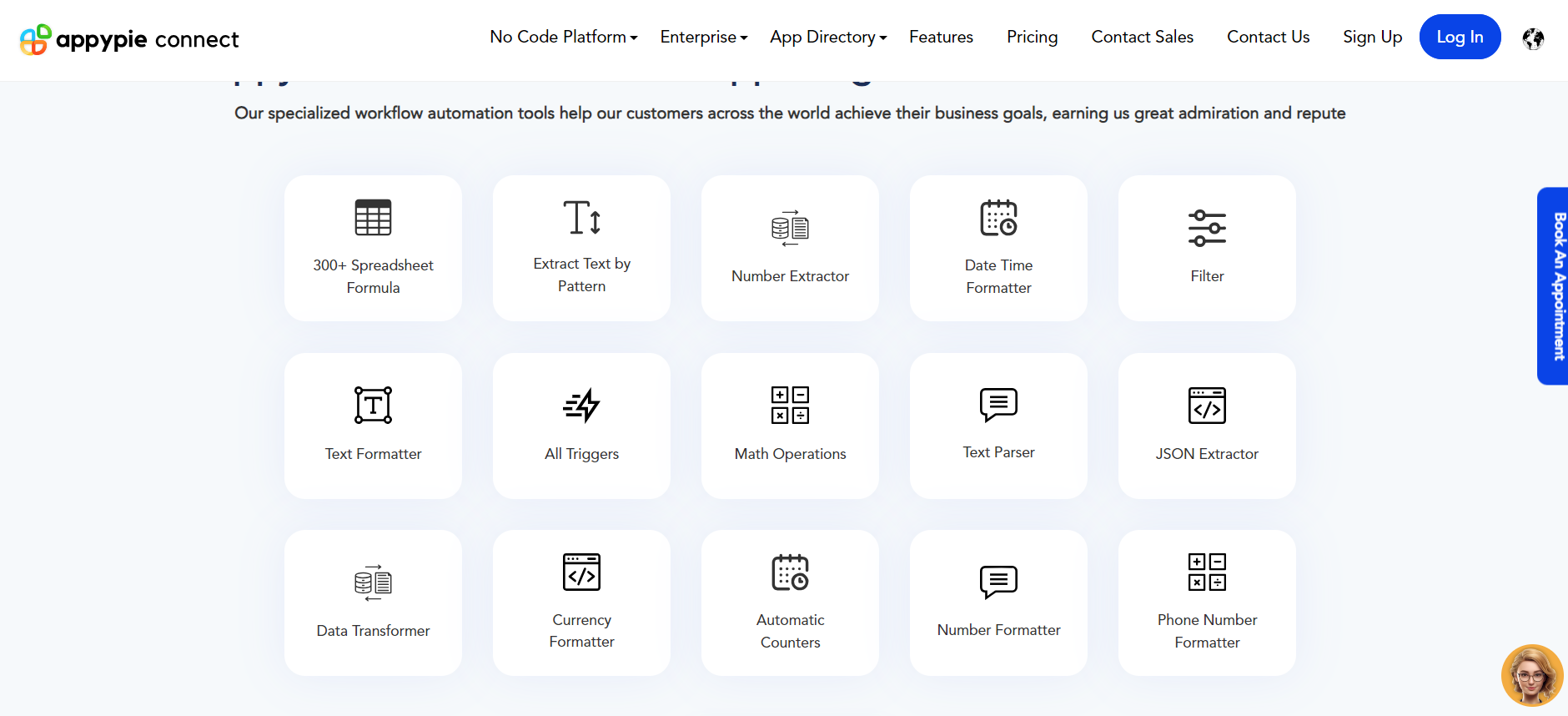
Marketing Features
Design FunctionalitiesRepresents how well each platform allows for creative design and customization of websites.Score Components:
- Template Variety (30%): Range and quality of design templates.
- Customization (30%): Flexibility and options for design alterations.
- User Interface (20%): Ease and intuitiveness of the design process.
- Responsiveness (10%): Adaptability to different devices and screen sizes.
- Innovation (10%): Unique design features and tools.
 6.9
6.9
 7.5
7.5
🏆
Overall Winner: Appy Pie
. Appy Pie edges out Tilda with a slightly higher score, offering a more comprehensive suite of marketing features, including ad creation and management, which Tilda lacks.

|

|
|
|---|---|---|
|
SEO Tools |
|
|
|
Email Marketing |
|
|
|
Blogging |
|
|
|
Social Media Integration |
|
|
|
Analytics and Reporting |
|
|
|
Ads and Promotions |
|
|
Customer Support
Customer supportEvaluates the quality and availability of support options.Score Components:
- Response time (40%): Speed of support responses.
- Support quality (30%): Effectiveness and helpfulness of the support.
- Availability (20%): Range of support channels (phone, chat, email).
- Resource richness (10%): Quality of self-help and educational materials.
 5.5
5.5
 8.2
8.2
🏆 Winner: Appy Pie
. In the Tilda vs Appy Pie comparison, Appy Pie takes the lead with its comprehensive 24/7 customer support available through live chat, email, and phone. Users benefit from prompt assistance and extensive documentation, ensuring a smooth experience when resolving issues. The platform’s commitment to providing reliable support is evident in its high customer support score of 8.2.
Tilda, on the other hand, offers customer support primarily via email, with no specified hours of availability. While Tilda provides a Help Center with articles and tutorials for self-help, its support services are not as robust as those of Appy Pie. This is reflected in Tilda’s lower customer support score of 5.5, indicating room for improvement in this area.
Security
SecurityLooks at the platforms’ security measures and data protection.Score Components:
- Data protection (40%): Safeguards for user and customer data.
- SSL and encryption (30%): Implementation of secure connections.
- Compliance (20%): Adherence to industry security standards.
- Regular updates (10%): Frequency of security updates and patches.
 7.6
7.6
 7.5
7.5
🏆
Winner: Tilda
. Tilda’s security measures are slightly more comprehensive than Appy Pie’s. Tilda has implemented several measures to ensure GDPR compliance and enhance the privacy and security of websites created with its platform. These include features for cookie consent, privacy policies, GDPR-friendly forms, and options for managing data retention and deletion. Additionally, Tilda provides built-in security features such as DDoS prevention and HTTPS encryption to safeguard user data.
Appy Pie also offers secure private data storage and protection for its users. With advanced encryption and strict access controls, users can trust that their personal information is safe and confidential. However, Tilda’s additional measures for GDPR compliance give it a slight edge over Appy Pie in terms of security.
AI Capabilities
AI capabilitiesMeasures the effectiveness of AI-driven features and tools.Score Components:
- Automation efficiency (40%): Impact of AI on streamlining processes.
- Personalization (30%): AI-driven customization for users or customers.
- AI-Assisted design (20%): Role of AI in website design and functionality.
- Data analysis (10%): Use of AI in interpreting user data and analytics.
 2.1
2.1
 7.2
7.2

|

|
|
|---|---|---|
|
AI Website Builder |
|
Appy Pie’s AI website builder designs and customizes websites based on user preferences |
|
AI Ecommerce Features |
|
Personalized shopping experiences and AI chatbots for customer service |
|
AI Content Generation |
AI feature for generating website content |
Advanced AI algorithms for generating top-notch content for blogs, marketing, and social media |
|
Additional AI Features |
|
Chatbots, virtual assistants, and AI-powered analytics |
🏆 Winner: Appy Pie
. With a score of 7.2, Appy Pie offers a comprehensive suite of AI features, including an AI website builder, AI ecommerce features, AI content generation, and additional AI features such as chatbots, virtual assistants, and AI-powered analytics. These features make website creation quick and easy for businesses and individuals, and help businesses automate customer interactions and make data-driven decisions.
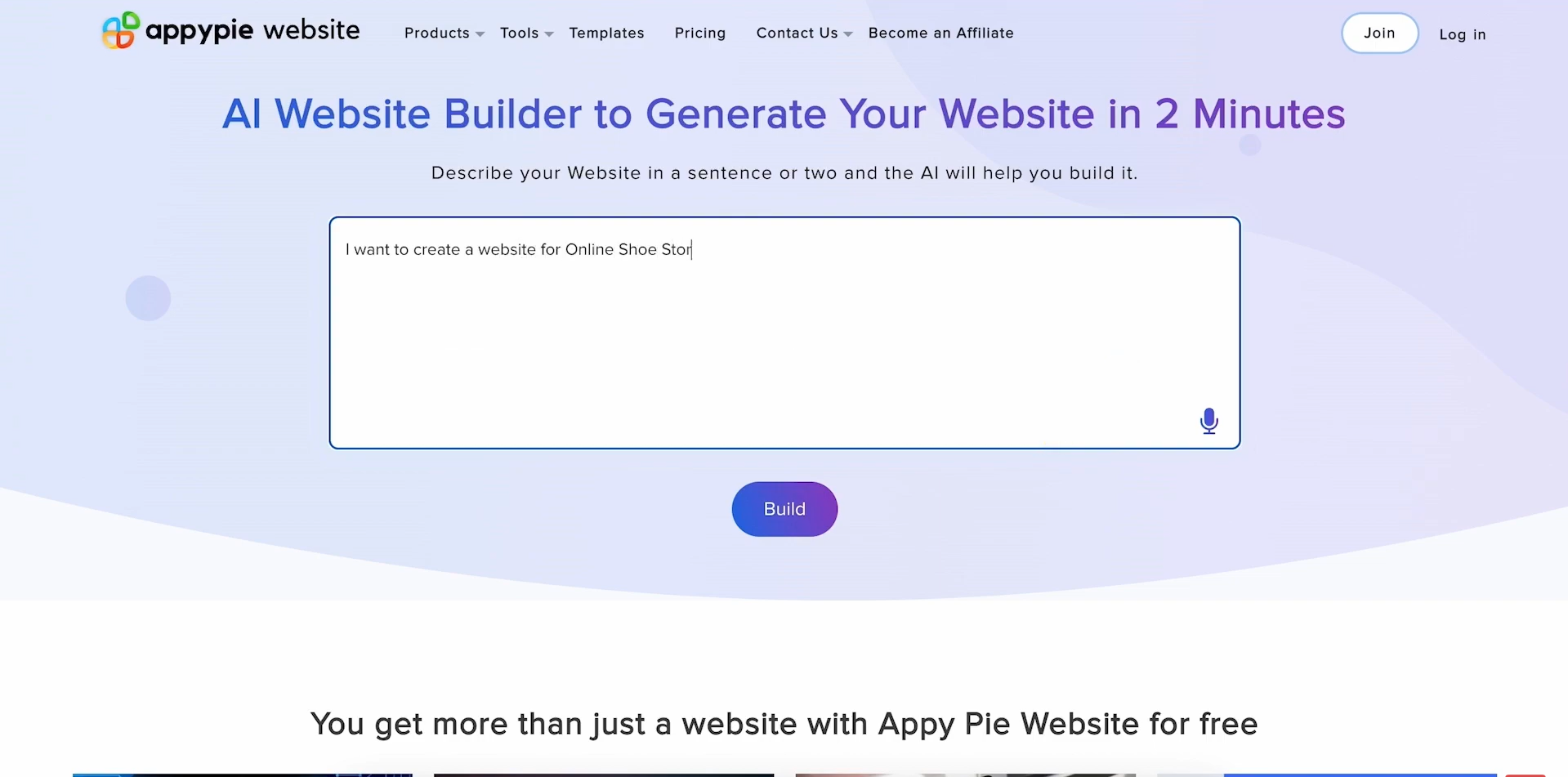
Tilda, with a score of 2.1, has limited AI capabilities, with its main AI feature being content generation. This feature generates website content, including headlines and text blocks, and is accessible through the Page Editor.
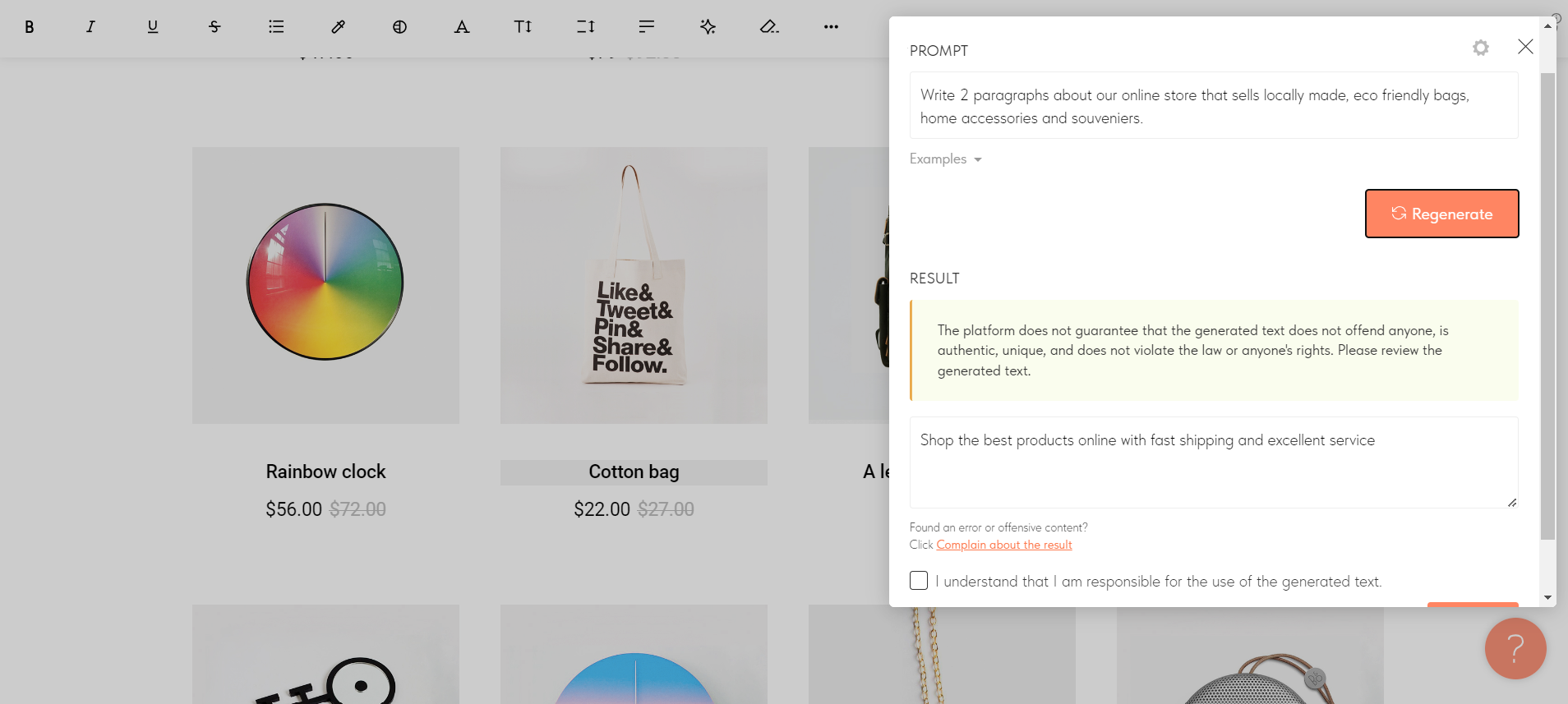
User Management
User ManagementAssesses the platforms’ capabilities in managing user roles, permissions, and accessibility.Score Components:
- Role Customization (40%): Flexibility in creating and defining user roles and
permissions. - Ease of Management (30%): User interface and tools for managing users.
- Access Control (20%): Effectiveness of access control measures for different user
levels. - Scalability (10%): Ability to manage a growing number of users efficiently.
 7.3
7.3
 7.3
7.3
🏆 Winner: Tie
. Both Tilda and Appy Pie scored 7.3 in user management, indicating similar capabilities in this area.
- Tilda’s Collaborators feature allows adding teammates with either Full or Limited access. Full access enables collaborators to edit, publish, delete pages, view requests and statistics, and make changes to built-in website services. Limited access allows the project owner to specify what actions the collaborator can perform. This feature is available as a premium offering, and adding more collaborators requires additional payment, with costs adjusted based on previously paid periods. It applies to the entire account, not individual projects, and collaborators can be managed or replaced through the Site Settings.
- The Appy Pie website builder offers different user access levels based on the plan chosen. For the Free Plan, one user has full editing privileges. Paid plans include the Starter Plan (3 users), Hobby Plan (5 users), Professional Plan (10 users), and Enterprise Plan (unlimited users). Each plan designates an Admin with full access and additional Editors with varying editing rights. Additionally, paid plans allow for customization of roles, enabling tasks such as content editing or design adjustments.
Tilda User Roles and Access Levels:
| Role | Description | Access Highlights |
|---|---|---|
| Full Access Collaborator | Can perform all actions | Edit, publish, delete pages, view requests and statistics, make changes to built-in website services. |
| Limited Access Collaborator | Access specified by project owner | Access to specified actions only. Can be managed or replaced through the Site Settings. |
Appy Pie User Roles and Access Levels:
| Role | Description | Access Highlights |
|---|---|---|
| Admin | Full control over website | Full editing privileges. Can manage other users. |
| Editor | Varies based on plan | Editing rights vary based on plan. Can perform tasks such as content editing or design adjustments. |
Additional Features

|

|
|
|---|---|---|
|
SSL Certificate |
|
|
|
Custom Domain |
|
|
|
Free Custom Domain Included |
|
|
|
International Domains |
|
|
|
Mobile Responsive |
|
|
|
Page Speed |
|
|
|
Website Builder Mobile App |
|
|
|
Convert a Website To An App |
|
|
|
Website Analytics |
|
|
|
Multilingual Sites |
|
|
|
Multiple Users |
|
|
User Feedback
Tilda Publishing receives varied feedback from users, highlighting its strengths in offering a no-code, customizable website building experience with features like Zero Block for personalization and easy backend setup. Users appreciate its affordability, user-friendly interface, and responsive customer support. However, criticisms include buggy font customization, limited design elements, and instability in some of its features. Despite these drawbacks, many find Tilda beneficial for creating professional websites quickly and managing multiple sites under one plan, although some users advise caution due to issues with stability and customer support.
Appy Pie garners positive feedback for its user-friendly interface and excellent customer support, offering low-code solutions for app and website building without requiring coding experience. Users appreciate its ease of use, extensive features, and ability to create apps and websites quickly. While some express a desire for more customization options and templates, overall, Appy Pie serves as a valuable tool for businesses and individuals seeking to create apps and websites efficiently, solving the problem of complex coding requirements and providing a platform for easy communication and engagement with users.
The making of this blog
We followed a clear, step-by-step process to write and research this article.
FAQ
Which platform is better for design flexibility, Tilda or Appy Pie?
Is Appy Pie easier to use than Tilda?
How do Tilda and Appy Pie compare in ecommerce capabilities?
Which platform offers better customer support, Tilda or Appy Pie?
Can I test both platforms before committing to a plan?
Which platform has better AI capabilities?
Are there any significant differences in the additional features offered by Tilda and Appy Pie?
What do users say about Tilda and Appy Pie?










